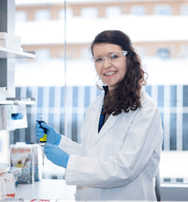

RACP Australian Rheumatology Association & D.E.V Starr Research Establishment Fellowship ($50,000)
Project: ‘Initiatives to facilitate earlydiagnosis and prevent disability in myositis’
Project Summary
Myositis is a rare autoimmune disease that occurs when the immune system inappropriately attacks muscles. This leads to weakness, disability and sometimes death. Diagnosis is often delayed by years, owing to a scarcity of specialist clinics and imperfect diagnostic tests. This is concerning, as treatment delays lead to irreversible muscle damage and poor outcomes. We propose a specialised translational myositis research program with the aim of preventing disability. We will undertake parallel approaches to improve existing diagnostic tools. We will determine whether using novel, highly sensitive technologies to detect trace factors in the blood or the use of innovative microscope techniques may facilitate diagnosis of myositis. Human studies will be complemented by laboratory-based discovery research studying the causes of irreversible muscle damage and how these may be prevented.
Finally, we will develop the first Victorian myositis registry to permit collaborative research efforts, which are critical to advance rare disease research.
2022 RACP Fellows Research Establishment Fellowship ($75,000)
Project: Utility of a Maturity Onset Diabetes of the Young (MODY) probability calculator and exome sequencing to diagnose monogenic diabetes in the Australian clinic setting.
Project Summary
This study seeks to streamline the identification of inherited forms of diabetes known as ‘monogenic diabetes’. The most common form of monogenic diabetes is referred to as ‘Maturity Onset Diabetes of the Young (MODY)’.
MODY accounts for 2–5 per cent of diabetes but is usually unrecognised. MODY may be treated with inexpensive sulphonyl urea tablets instead of lifelong insulin therapy that carries risks of hypoglycaemia, weight gain, poorer glycaemic control, and pregnancy complications. Finding the genetic error causing MODY facilitates personalised care in individuals and earlier diagnosis in relatives. Though there are >80 known MODY genes, some families – especially non-Europeans – have negative genetic results, and novel MODY genes remain to be discovered. MODY is not routinely screened for in Australia, representing a missed opportunity for lessening the impact of diabetes. The Exeter MODY Probability Calculator has been validated by Europeans, but it is yet to be evaluated in multicultural Australian clinics.
The Jacquot Research Establishment Fellowship ($90,000)
Project: ‘The UNICORN study: UNravelling the Immune mechanisms contributing to Childhood steroid Resistant Nephrotic syndrome’.
Project Summary
Children with steroid-resistant nephrotic syndrome face an uphill battle. The disease is poorly understood by clinicians and researchers, and differences between patient groups are not clear and, as a result, treatment regimens for individuals are based on best guess, rather than evidence based, and unfortunately many patients show no response to any therapy and have not inconsiderable side-effects . Disease progression reflects progressive decline. The most difficult aspect is knowing that, should the disease progress to end stage kidney failure, the chance of recurrence of a transplant is high – up to 80 per cent for some children – often resulting in loss of the transplant.
The UNICORN study is designed to find answers as to why some children have a higher risk of more serious initial disease and of disease recurrence following transplantation, and to clarify the molecular pathways involved and identify potential targets for existing or novel treatments.
Cottrell Research Establishment Fellowship ($75,000)
Project: ‘Emerging Infectious Diseases in Children: Surveillance that Informs Action’.
Project Summary
The Coronavirus Disease 2019 (COVID-19) pandemic emphasised the risks of emerging infectious diseases. Severe neurological and respiratory illnesses are recognised marker syndromes of emerging infectious diseases. I will build upon and develop existing surveillance platforms for severe neurological and respiratory illnesses in children so as to be able to fully describe these diseases and undertake studies to discover better approaches to detection, diagnosis and management.
RACP Fellows Research Entry Scholarship ($45,000)
Project: ‘The role of the gut-liver axis in the pathogenesis of alcohol related liver disease’
Project Summary
One fundamentally simple and important clinical question defines this project: why do some heavy drinkers not develop alcohol Alcohol related Lliver disease Disease (ArLD), while other drinkers develop ArLD quickly despite suchsimilar exposures ? Could this be some interaction between host genome and transcriptomes with gut microbiome? Characterising all the clinical and multi-omics elements of this question provides a unique collaborative opportunity. By preferentially recruiting patients of ‘extreme phenotype’ (severe ArLD/ mild alcohol exposure, no ArLD/ high alcohol exposure) we will aim to answer this important question.
Understanding the interaction of effects will help to personalise medical in two ways. Firstly, by recognising individuals at more risk of ArLD, stronger prevention and intervention strategies may be engaged earlier to prevent alcohol related harm. Secondly, identifying a protective element of the gut-liver axis and gut microbiome may identify therapeutic targets that may be utilised to attenuate progressive ArLD in individuals with severe alcohol dependence.
Vincent Fairfax Family Foundation Research Entry Scholarship ($12,600)
Project: ‘Optimising Efficacy of Radionuclide Therapy in Advanced Prostate Cancer’.
Project Summary
Prostate cancer remains the most diagnosed cancer and the second leading cause of cancer-related death in men in Australia. Standard treatment options include chemotherapy and hormonal therapy. Despite these treatments, overall survival for metastatic castration-resistant prostate cancer (mCRPC) remains poor and new treatments are urgently needed.
177Lu-PSMA is a new form of targeted radionuclide therapy (RNT) which has recently been FDA-approved for use in mCRPC. Despite an initial response in some, all patients eventually develop progression on this treatment.
We plan to conduct two world-first combination clinical trials with 177Lu-PSMA RNT, in men with mCRPC. These trials aim to address and overcome mechanisms of resistance to 177Lu-PSMA monotherapy, which will hopefully lead to more durable responses.
We will also examine “liquid biopsy” samples from the trial patients, and correlate these with outcomes. We hope to identify blood markers associated with treatment response and resistance to aid with patient selection.
Goal four
RACP FOUNDATION
AWARD RECIPIENTS


